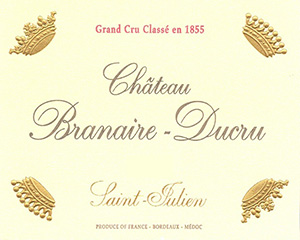| Region | |
|---|---|
| Subregion | France > Bordeaux > Left Bank > St Julien |
| Colour | Red |
| Type | Still |
A classic Saint Julien château that produces wines of real St Julien class and structure. The 60 hectares of vines are planted with 65% Cabernet Sauvignon, 28% Merlot, 3% Cabernet Franc and 4% Petit Verdot. Purchased by the late Patrick Maroteaux in 1988, it is now run by his son Francois-Xavier.

The 2021 Branaire-Ducru has realized all the potential it showed en primeur. Wafting from the glass with aromas of dark berries, plums, menthol, violets and baking chocolate, it's medium to full-bodied, supple and suave, with a velvety attack that segues into a deep, fleshy palate. This is especially impressive in the context of the vintage. Drink 2025-2041.
Francois-Xavier told us that this is a Cabernet vintage and that the proportion of Merlot in the blend is the lowest for nearly 20 years. The vintage was saved by them being able to pick Cabernet Sauvignon until October 14th and it makes up 66% of the blend with 22% Merlot, 6.5% Cabernet Franc and 5.5% Petit Verdot. The yield was 32 hl/ha, down from 40 hl/ha last year. Deep ruby colour. Mint oil and blackcurrant on the nose, that has a lightly forced sweetness. The palate follows, quite rich in extract and structure with layered cassis and dark fruit. Firm for the vintage, lingering with dark fruit, blackcurrant leaf, incense and more mint on the finish.
A very pretty wine, showing blackberry and blackcurrant aromas with crushed stone. Medium to full body with layers of fine-grained tannins. Bright and refined. Lots of dark fruit at the end. Solid weight.
Made from 66% Cabernet Sauvignon, 22% Merlot, 6.5% Cabernet Franc, and 5.5% Petit Verdot, the 2021 Branaire-Ducru is deep garnet-purple in color. It comes bounding out of the glass with bold scents of warm cassis, blackberry preserves, and ripe black plums, followed by hints of camphor, violets, black truffles, and tapenade, with a waft of wood smoke. Light to medium-bodied, the palate delivers impressive intensity with firm, fine-grained tannins and seamless freshness, finishing long with a mineral lift.
2026-2035
Well balanced, showcasing the possibliities of the vintage, a little austere in its rose stem and cassis bud character, but it opens up to show finessed blackberry fruit, precisely cut tannins, and has plenty of potential to age. 32hl/ yield, up to 20 month ageing depending on tasting. Tasted twice.
66% Cabernet Sauvignon, 22% Merlot, 6.5% Cabernet Franc, 5.5% Petit Verdot. Cask sample.
Open and aromatic on the nose with savoury and dark-fruit notes. Supple and fleshy on the palate. Lacks a bit of density but there’s a structure well in place. Competent rather than stirring. (JL)
Drink 2026 – 2036
Having tasted the 2021 Branaire-Ducru six times over the course of a month and a half, I feel confident in saying that it is a beautiful wine that numbers among the vintage's real successes. Offering up aromas of raspberry coulis and red cherries mingled with notions of rose petals, cigar box and spices, it's medium to full-bodied, ample and seamless, with a layered core of fruit, lively acids and beautifully powdery tannins. Why is it quite so good? It isn't because a lot of wine was declassified, as around 60% of the estate's production went into the grand vin this year—a touch more than average. Rather, the key factors seem to be waiting to pick despite an alarming weather forecast; the blend itself, which emphasizes ripe Cabernet and the estate's later-ripening Merlot on clay-limestone soils; and the fact that a partially completed new winery means that Branaire already had fully 63 fermentation vats at its disposal to pick and vinify parcel by parcel. The exact composition is 66% Cabernet Sauvignon, 22% Merlot and the rest Cabernet Franc and Petit Verdot.